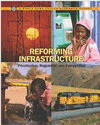Download Reforming Infrastructure. Privatization, Regulation, and Competition PDF Free - Full Version
Download Reforming Infrastructure. Privatization, Regulation, and Competition by Kessides I.N. in PDF format completely FREE. No registration required, no payment needed. Get instant access to this valuable resource on PDFdrive.to!
About Reforming Infrastructure. Privatization, Regulation, and Competition
Infrastructure is crucial for generating growth, alleviating poverty, and increasing international competitiveness. For much of the 20th century and in most countries, the network utilities that delivered infrastructure servicessuch as electricity, natural gas, telecommunications, railroads, and water supplywere vertically and horizontally integrated state monopolies. This approach often resulted in extremely weak services, especially in developing and transition economies, and particularly for poor people. Common problems included low productivity, high costs, bad quality, insufficient revenue, and shortfalls in investment. Recognizing infrastructures importance, many countries over the past two decades have implemented far-reaching infrastructure reformsrestructuring, privatizing, and establishing new approaches to regulation. Reforming Infrastructure identifies the challenges involved in this massive policy redirection within the historical, economic, and institutional context of developing and transition economies. It also assesses the outcomes of these policy changes, as well as their distributional consequencesespecially for poor households and other disadvantaged groups. And, drawing on a range of international experiences and empirical studies, it recommends directions for future reforms and research to improve infrastructure performanceidentifying pricing policies that strike a balance between economic efficiency and social equity, suggesting rules governing access to bottleneck infrastructure facilities, and proposing ways to increase poor peoples access to these crucial services.
Detailed Information
| Author: | Kessides I.N. |
|---|---|
| Publication Year: | 2004 |
| Pages: | 325 |
| Language: | English |
| File Size: | 3.754 |
| Format: | |
| Price: | FREE |
Safe & Secure Download - No registration required
Why Choose PDFdrive for Your Free Reforming Infrastructure. Privatization, Regulation, and Competition Download?
- 100% Free: No hidden fees or subscriptions required for one book every day.
- No Registration: Immediate access is available without creating accounts for one book every day.
- Safe and Secure: Clean downloads without malware or viruses
- Multiple Formats: PDF, MOBI, Mpub,... optimized for all devices
- Educational Resource: Supporting knowledge sharing and learning
Frequently Asked Questions
Is it really free to download Reforming Infrastructure. Privatization, Regulation, and Competition PDF?
Yes, on https://PDFdrive.to you can download Reforming Infrastructure. Privatization, Regulation, and Competition by Kessides I.N. completely free. We don't require any payment, subscription, or registration to access this PDF file. For 3 books every day.
How can I read Reforming Infrastructure. Privatization, Regulation, and Competition on my mobile device?
After downloading Reforming Infrastructure. Privatization, Regulation, and Competition PDF, you can open it with any PDF reader app on your phone or tablet. We recommend using Adobe Acrobat Reader, Apple Books, or Google Play Books for the best reading experience.
Is this the full version of Reforming Infrastructure. Privatization, Regulation, and Competition?
Yes, this is the complete PDF version of Reforming Infrastructure. Privatization, Regulation, and Competition by Kessides I.N.. You will be able to read the entire content as in the printed version without missing any pages.
Is it legal to download Reforming Infrastructure. Privatization, Regulation, and Competition PDF for free?
https://PDFdrive.to provides links to free educational resources available online. We do not store any files on our servers. Please be aware of copyright laws in your country before downloading.
The materials shared are intended for research, educational, and personal use in accordance with fair use principles.

